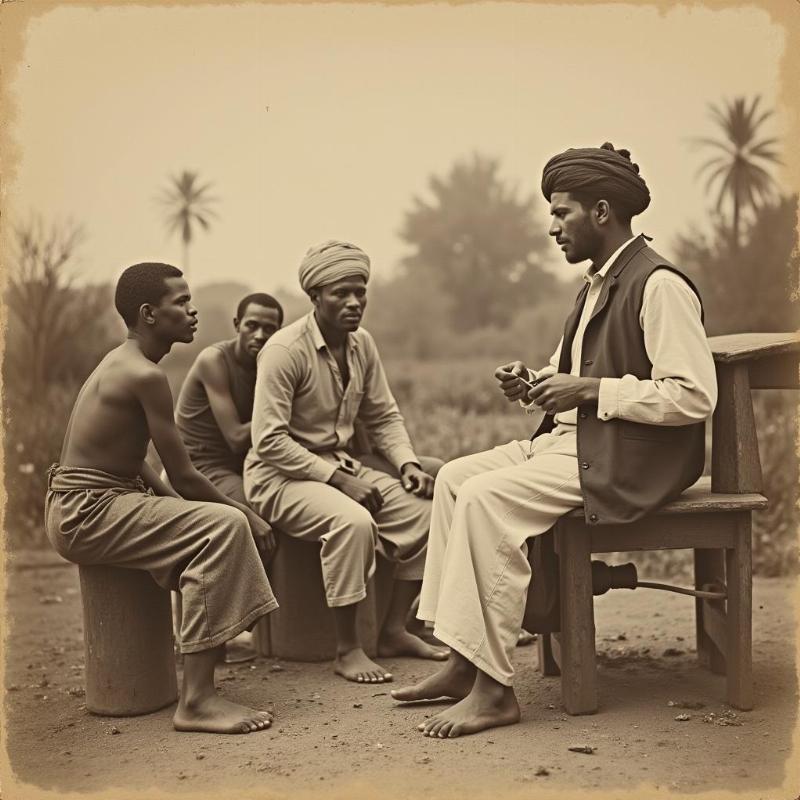Nambardar Place, a term deeply rooted in Indian history and culture, evokes a sense of traditional authority and community leadership. Understanding its significance provides a fascinating glimpse into India’s rural social structure and its evolution. This article delves into the history, roles, and continuing relevance of the Nambardar, offering valuable insights for both domestic and international travelers interested in experiencing the authentic heart of India.
The Historical Significance of the Nambardar
The term “Nambardar” originates from the Mughal era, denoting a village headman responsible for revenue collection and maintaining law and order. The position held considerable power and influence within the village community, acting as a bridge between the ruling authority and the local populace. The Nambardar’s role was often hereditary, passed down through generations, further solidifying their status within the village hierarchy.
 Nambardar's Historical Role
Nambardar's Historical Role
The Evolving Roles of a Nambardar
While the traditional role of revenue collection has diminished in modern India, the Nambardar continues to play a crucial role in village administration. They often act as mediators in local disputes, represent the village in government interactions, and oversee community development projects. Their deep understanding of local customs and traditions makes them invaluable in resolving conflicts and ensuring social harmony.
How Nambardars Contribute to Community Development
Nambardars are actively involved in promoting education, healthcare, and infrastructure development within their villages. They work closely with government agencies and NGOs to implement various welfare schemes and ensure that the benefits reach the intended recipients.
Meeting a Nambardar: A Cultural Immersion
For travelers seeking an authentic cultural experience, interacting with a Nambardar can be incredibly enriching. It offers a unique opportunity to understand the intricacies of village life, learn about local customs and traditions, and gain insights into the challenges and triumphs of rural India.
What to Expect When Visiting a Nambardar
Visiting a Nambardar’s home is often a humbling experience. Be prepared to be welcomed with warm hospitality, offered traditional refreshments, and engaged in conversations about the village’s history and present-day realities. Remember to be respectful of local customs and traditions.
Nambardar Place and its Connection to Land Ownership
The term “Nambardar Place” can also refer to the land or property traditionally associated with the Nambardar’s family. These properties often hold historical significance and serve as a reminder of the Nambardar’s lineage and legacy within the community.
Conclusion: Embracing the Legacy of the Nambardar
Nambardar Place represents more than just a physical location; it embodies a rich history of leadership, community, and cultural heritage. By understanding the significance of the Nambardar, we gain a deeper appreciation for the fabric of rural India. For travelers seeking an authentic and immersive experience, exploring the world of the Nambardar offers a unique opportunity to connect with the heart and soul of India.
FAQ:
- What is the origin of the term “Nambardar”? The term originates from the Mughal era.
- What are the primary roles of a Nambardar? They act as mediators, community representatives, and oversee development projects.
- How can I meet a Nambardar? Respectful inquiries within the village can often lead to an introduction.
- What is the significance of “Nambardar Place”? It refers to the land or property associated with the Nambardar’s family.
- Why is understanding the role of the Nambardar important for travelers? It offers valuable insights into the social and cultural dynamics of rural India.
PlaTovi, your trusted travel companion, specializes in crafting unforgettable experiences across India. Whether you’re seeking a traditional tour, exploring cultural heritage, or looking for unique local experiences, we’ve got you covered. Our services include traditional tour packages (sightseeing + dining + shopping), hotel & resort bookings, international & domestic flight bookings, event & wedding planning, car rentals & airport transfers, and visa & documentation assistance. Connect with us to plan your next adventure! Email: [email protected], Phone: +91 22-2517-3581. Let PlaTovi help you discover the magic of India.